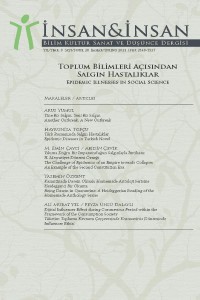Research Article
Year 2021,
Volume: 8 Issue: 28, 13 - 31, 01.04.2021
Abstract
Dünya tarihi bir anlamda çok sayıda can kayıplarına neden olan salgınların da tarihidir. Aşıların ve diğer bilimsel, tıbbi ve teknolojik müdahale ve inovasyonların sağladığı tüm olumlu değişiklik ve ilerlemelere rağmen tarihsel tanıklıklar gösteriyor ki en azından iki bin beş yüz yıldır salgınlar ve ölüm karşısında insanın savunmasızlığı, çaresizliği, hastalık ve ölümle başa çıkma yolları ve -kişiden kişiye farklılık gösterse de- temel tepkileri değişmemektedir. Bu makale, tarihteki salgınlardan Atina Salgını (M.Ö. 430), Justiniyanus Veba Salgını (541-542), Kara Ölüm (1347-1351) veya Büyük Veba Salgını ve onunla bağlantılı olduğu düşünülen Büyük Londra Salgını (1665-1666), Fas Veba Salgını (1799) ve İspanyol Gribini (1918-1920) ilk elden ve yaşayanların tanıklıklarından yola çıkarak ele alıyor. Sonuçta, farklı dönem ve farklı şartlarda yaşanan bu salgınların benzer davranış kalıplarına yol açtığını gösteriyor.
References
- Boccaccio, Giovanni. The Decameron. New York: Printed for the Trade, 1899.
- Defoe, Danie. A Journal of the Plague Year. Londra: Cassel, 1909.
- Jackson, James Grey. An Account of Timbuctoo and Housa: Tewrritories in the Interior of Africa., London: Longman, Hurst, Rees, Orme and Brown, 1820.
- Nirala, Suryakant Tripathi, A Life Missspent. Çev. Satti Khanna. New York: Harper Perennial, 2016.
- O’Hara, John. The Doctor’s Son. New York: Library of America E-Book Classics, 2016.
- Pepys, Samuel. The Diary of Samuel Pepys. Londra: Macmillan, 1905.
- Procopius. History of the Wars, Books I & II. Çev. H. B. Dewing, Londra: William Heinemann, 1914.
- Procopius. History of the Wars, Books III & IV. Çev. H. B. Dewing, Londra: William Heinemann, 1916.
- “John of Ephesus describes the Justinianic Plague”. Haz., Roger Pearse. Erişim 3 Ocak, 2021. https://www.roger-pearse.com/weblog/2017/05/10/john-of-ephesus-describes-the-justinianic-plague/.
- Stefani, Marchione di Coppo. “The Florentine Chronicle”. Fordham University. Erişim 8 Ocak, 2021. https://sourcebooks.fordham.edu/med/marchione.asp.
- Thucydides. The History of the Peloponessian War. Çev. Henry Dale New York: Harper & Brothers, 1878.
Year 2021,
Volume: 8 Issue: 28, 13 - 31, 01.04.2021
Abstract
In a sense, the world history is also the history of epidemics and pandemics that have caused huge numbers of deaths. Regardless of all positive advances brought about by vaccines and other scientific, medical and technological interventions and innovations, historical testimonies demonstrate that human vulnerability, despair and ways of dealing with disease and death, and - although they differ from one person to another- basic human reactions in the face of epidemics and death have not greatly changed for at least two thousand and five hundred years. This article deals with the testimonies of first-hand witnesses of the Athenian Plague (B.C.E. 430); Justinian Plague (541-542); Black Death, or the Great Plague (1347-1351); the Great Plague of London (1665-1666); the Plague of Morocco (1799), and the Spanish Flu (1918-1920). It shows that epidemics occurring in different times and under different conditions, by and large, lead to similar and comparable behaviour patterns.
Keywords
References
- Boccaccio, Giovanni. The Decameron. New York: Printed for the Trade, 1899.
- Defoe, Danie. A Journal of the Plague Year. Londra: Cassel, 1909.
- Jackson, James Grey. An Account of Timbuctoo and Housa: Tewrritories in the Interior of Africa., London: Longman, Hurst, Rees, Orme and Brown, 1820.
- Nirala, Suryakant Tripathi, A Life Missspent. Çev. Satti Khanna. New York: Harper Perennial, 2016.
- O’Hara, John. The Doctor’s Son. New York: Library of America E-Book Classics, 2016.
- Pepys, Samuel. The Diary of Samuel Pepys. Londra: Macmillan, 1905.
- Procopius. History of the Wars, Books I & II. Çev. H. B. Dewing, Londra: William Heinemann, 1914.
- Procopius. History of the Wars, Books III & IV. Çev. H. B. Dewing, Londra: William Heinemann, 1916.
- “John of Ephesus describes the Justinianic Plague”. Haz., Roger Pearse. Erişim 3 Ocak, 2021. https://www.roger-pearse.com/weblog/2017/05/10/john-of-ephesus-describes-the-justinianic-plague/.
- Stefani, Marchione di Coppo. “The Florentine Chronicle”. Fordham University. Erişim 8 Ocak, 2021. https://sourcebooks.fordham.edu/med/marchione.asp.
- Thucydides. The History of the Peloponessian War. Çev. Henry Dale New York: Harper & Brothers, 1878.
There are 11 citations in total.
Details
| Primary Language | Turkish |
|---|---|
| Journal Section | Articles |
| Authors | |
| Publication Date | April 1, 2021 |
| Published in Issue | Year 2021 Volume: 8 Issue: 28 |


